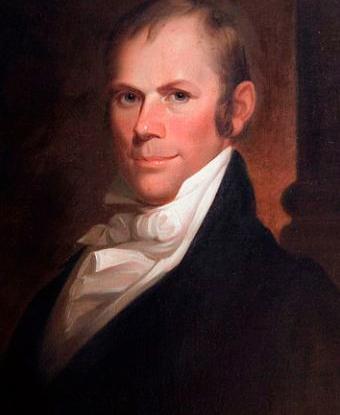Last updated: February 22, 2019
Person
Henry Clay

Henry Clay was born in Hanover County, Virginia, on April 12, 1777. After his father died, his mother remarried and Clay moved to Richmond. Despite little formal education, his stepfather secured him a position with the clerk of the High Court of Chancery, where Clay displayed a great affinity for law. He began law studies in 1796 and, after finishing a year later, moved to Lexington, Kentucky where he earned a reputation as a skillful lawyer and a dynamic speaker.
Clay entered politics as a state legislator in 1803 and exerted such influence that just three years later he was elected to serve out the last year of John Breckinridge's vacated U.S. Senate seat. From 1811 to 1821 and 1833 to 1825, Henry Clay served as a member of the U.S. House of Representatives and was Speaker of the House from 1811 to 1820. In 1820, Clay spearheaded the Missouri Compromise, which dealt with the expansion of slavery. Although himself a slaveholder, he was in favor of gradual emancipation. He served as Secretary of State under John Quincy Adams (1825-1829), though his appointment was tainted by charges of a "corrupt bargain" with Adams as a means of defeating Andrew Jackson.
Returning to the Senate, Clay in 1833 brokered a deal of the Nullification Crisis, indicative of the growing conflict between interests in the North and South. In 1832 and 1844, Clay was the presidential nominee of the new Whig Party, though he was defeated both times. After losing the Whig Party nomination to Zachary Taylor in 1848, Clay decided to retire to his Ashland estate in Lexington, Kentucky. However, the very next year, he was returned to the Senate from Kentucky. During his term, with the addition of the lands acquired during the Mexican-American War, the controversy over the expansion of slavery into new territories had reemerged.
Once again, Henry Clay, the "Great Compromiser," drafted legislation to reduce the conflict between slave states of the South and the free states of the North; the Comprise of 1850 passed in September of 1850 and delayed secession and civil war for another 10 years. Henry Clay died in 1852, still serving his country and home state of Kentucky in the Senate and was the first person accorded the honor of lying in state at the United States Capitol.
